Emergency Preparedness

Kanawha County Metro 911 - RAVE ALERT
Emergency communication system to keep residents updated during emergencies.
Messages can be sent to your home phone, cell phone, or email.
List of Services
-
Preparing for Emergencies as a person with a disabilityList Item 3
Disability intersects every demographic group—there are people with disabilities of all ages, races, sex or national origin. And, disabilities can impact a person in a variety of ways—both visible and invisible. For people with disabilities and their families, it is important to consider individual circumstances and needs to effectively prepare for emergencies and disasters.
-
Create an Emergency PlanList Item 1
Make a plan today. Your family may not be together if a disaster strikes, so it is important to know which types of disasters could affect your area. Know how you’ll contact one another and reconnect if separated. Establish a family meeting place that’s familiar and easy to find.
-
Build an Emergency KitList Item 2
After an emergency, you may need to survive on your own for several days. Being prepared means having your own food, water and other supplies to last for several days. A disaster supplies kit is a collection of basic items your household may need in the event of an emergency.
-
Shelters and Warming/Cooling StationsList Item 4
Sheltering is appropriate when conditions require that you seek protection in your home, where you work or other location when other emergencies arise. The length of time you are required to take shelter may be short, such as during a tornado warning, or during a pandemic. In all cases, it is important that you stay informed and follow the instructions of local authorities.
-
Fire Safety
Learn the best practices for home fire safety and fire safety with children.
American Red Cross — Sound the Alarm & Home Fire Campaign
Free smoke alarm installations, fire safety education, door-to-door or event-based help. If you need a free smoke alarm or help with installation,
call 1-800-733-2767.
Accessible Smoke Alarm Project (ASAP), WV Distributes accessible smoke alarms at no cost to homeowners who are deaf or hard of hearing. These alarms include special features like flashing lights, bed shakers, etc.
Apply https://dhhr.wv.gov/cdhh/equipment
Charleston Fire Department offers Fire safety education, public training, and local fire prevention efforts. They sometimes partner in free alarm installations in emergency situations.
Office number (non-emergency) is (304) 348-8137.
